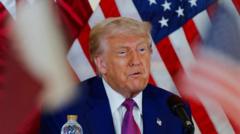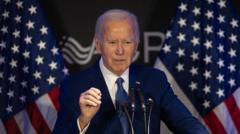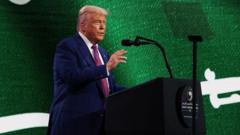As the anniversary of the January 6 Capitol riots approaches, Donald Trump's efforts to recast the event as a "day of love" highlight the ongoing reinterpretation of violent political actions in the U.S. while igniting further political divides that shape the nation's narrative.
The Legacy of January 6: Reinterpretation and Political Narratives

The Legacy of January 6: Reinterpretation and Political Narratives
Four years after the January 6 Capitol riot, Donald Trump's reinterpretation of events continues to influence American political discourse and societal divisions.
The date of January 6 marks a significant moment in American history as it recalls the violent attack on the U.S. Capitol in 2021. Fueled by the baseless claim from Donald Trump that the 2020 presidential election had been stolen, rioters stormed the Capitol, brandishing weapons and causing extensive damage. Tragically, the events led to multiple fatalities, including a protester shot by law enforcement and several police officers who later died by suicide due to the trauma experienced that day.
In the aftermath of the riot, it appeared that Trump’s presidency had reached an impasse. However, as he prepares to take the oath of office once more in an upcoming ceremony, his narrative surrounding January 6 has evolved. Trump and his supporters have worked diligently to recast the riot, often labeling it as a "day of love" rather than an insurrection, thereby seeking to legitimize and memorialize the actions of that day.
Trump's narrative has been aided by a faction of congressional allies and media outlets that downplay the severity of the events. The rhetoric surrounding the rioters has shifted, with some now viewed as patriotic martyrs instead of criminals, and many advocates are pressing for their release or exoneration. Trump's intentions to pardon these individuals on his first day back in office further underline this shift in perception and highlight the political capital he aims to accrue from the fallout of the insurrection.
While Trump paints a picture of a nation beleaguered by crises, the reality conveyed by metrics and statistics presents a starkly different narrative, illustrating the complexities of American life. Despite potential legal repercussions and his status as a convicted felon in a separate case, he seeks to reclaim his position and redefine the dialogue surrounding not only January 6 but the broader implications of his presidency and legacy during this tumultuous time in U.S. history.





















